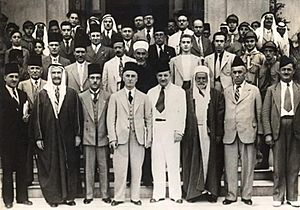Bloudan Conference of 1937 facts for kids

The Bloudan Conference of 1937 was a very important meeting held in Bloudan, Syria. It took place on September 8, 1937. This was the first major meeting of Arab leaders and representatives from different Arab countries. They gathered to discuss important issues facing the Arab world.
The conference was organized by the Arab Higher Committee. It happened because of a plan called the Peel Commission. This plan suggested dividing Palestine, which was then controlled by the British, into separate Arab and Jewish states. The people at the Bloudan Conference did not agree with this plan. They strongly supported the 1936–39 Arab revolt in Palestine against the British. They also opposed the increasing number of Jewish people moving to Palestine. The Bloudan Conference was a key moment. It showed that Arab countries were working together to address the Zionist movement. Another Bloudan Conference was held later in 1946.
Contents
Why the Conference Happened and Who Attended
The Arab Higher Committee first asked to hold the meeting in Jerusalem. But the British government said no. So, the small town of Bloudan in Syria was chosen instead.
Gathering Arab Leaders
Hundreds of delegates came from many Arab countries. Most were from the eastern part of the Arab world. The main goal was to "study the duties of the Arabs" and "resist the dangers posed by the Zionists."
Key Decisions Made
During the conference, several important decisions were made. The delegates rejected the plan to divide Palestine. They also said no to creating a Jewish state there. They strongly stated that Palestine was a key part of the Arab world. Different groups were formed to find ways to resist the partition plan. The Bloudan Conference showed strong support from across the Arab world for the anti-Zionist movement in Palestine.
Important People at the Conference
The meeting was led by Naji al-Suwaidi, who used to be the prime minister of Iraq. Other important leaders helped lead the conference. These included Shakib Arslan from Lebanon, Mohammed Alluba Pasha from Egypt, and Bishop Ali Hurayki from Homs.
Even though the Syrian government didn't officially join, Syria had the most delegates. There were 115 people from Syria. Palestine sent 97 delegates, and Lebanon sent 59. Riad al-Solh led the Lebanese group. Transjordan had 29 delegates, Iraq had 9, and Egypt had 2. One delegate came from Tripolitania. Leaders from other places also sent messages of support. These included Ahmad al-Sabah, the leader of Kuwait. Groups from cities in Egypt, Tunisia, Algeria, and Morocco also sent their support.
Secret Youth Meeting
After the main conference, some delegates held a secret meeting in Damascus. This group was called the Conference of Nationalist Youth. They wanted to unite Arab youth more strongly. They also planned a bigger conference to be held in Europe. Some of the people at this secret meeting included Yunus al-Sab'awi and Sabri al-Asali.
How People Reacted to the Conference
The French government in Lebanon did not want Lebanese people to join the conference. A newspaper that supported the government said it was better for Lebanon not to upset either Jewish or Arab people. Some Lebanese delegates at the conference wanted to condemn Lebanon's neutral stance. However, this idea was rejected. Many Syrian delegates and Naji al-Suwaidi feared it would cause problems with the Lebanese government.
British Concerns
The British government was worried about the meeting. The British Consulate in Damascus said the discussions about Palestine were bringing back pan-Arab feelings. The consul described a pamphlet given out at the conference as "startlingly inflammatory." This pamphlet was called "Islam and Jewry." The consul said it showed how much passion the organizers wanted to create. An informant at the conference called it "a violently anti-Jewish pamphlet." It was given to everyone who attended the Bloudan Congress.
Different Views on the Conference
Fu'ad Mufarrij, an important delegate, believed the Bloudan Conference showed the hopes and goals of the Arab people. He thought it was a big step towards achieving those aims. However, a Lebanese historian named Raghid al-Solh had a different view. He believed the Bloudan Conference and other similar meetings in the late 1930s focused mainly on Palestine. He felt they mostly tried to keep the political situation as it was. He thought that bigger goals like Arab unity and freedom from European control were mostly ignored.
 | Aurelia Browder |
 | Nannie Helen Burroughs |
 | Michelle Alexander |

